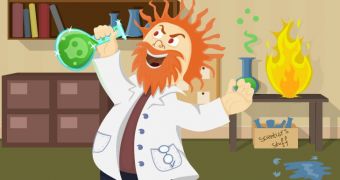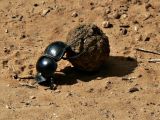Scientists aren't always the most serious of people, and some of their investigations and findings are downright silly. Luckily for them (and for us), this doesn't mean that they shouldn't be awarded for their achievements.
This is precisely what the Ig Nobel Prize ceremony is all about.
This year's winners were announced, awarded and poked fun at this past Thursday night. The ceremony took place in the Sanders Theater on the Harvard University campus.
Scroll down to find out who the winners of the 2013 Ig Nobels were.
The Medicine Prize
This year's Ig Nobels Medicine Prize was awarded to a team of researchers who have found that opera music helps mice that suffered a heart transplant live longer.
More precisely, Verdi's “La Traviata” kept them alive for about 27 days. By comparison, rodents that weren't made to listen to any kind of music only lived for an average of 7 days.
The title of their paper was “Auditory stimulation of opera music induced prolongation of murine cardiac allograft survival and maintained generation of regulatory CD4+CD25+ cells.”
It was published in the Journal of Cardiothoracic Surgery in March 2012.
The Psychology Prize
2013's Ig Nobels Psychology Prize was won by a team of scientists who, after spending numerous hours investigating the phenomenon, reached the conclusion that drunk people more often than not come to think that they are much more attractive than they really are.
Truth be told, those who regularly visit bars have long noticed that alcohol tends to distort the way people see themselves and those around them.
Still, it took a bunch of scientists to prove beyond a shadow of a doubt that this is indeed the case.
The paper, “Beauty Is in the Eye of the Beer Holder,” was published in the British Journal of Psychology in May 2012.
The Joint Prize in Biology and Astronomy
A team of researchers who has managed to prove that dung beetles look at the Milky Way and use it to guide themselves whenever they wish to travel home was awarded this year's Ig Nobels Joint Prize in Biology and Astronomy.
What's interesting is that, in order to stare at the Milky Way and thoroughly analyze it, dung beetles roll a perfect ball of poop, and then climb on top of it, presumably to gain some much needed elevation.
Or maybe the poop has some mystical, magical powers and helps them better communicate with the stars.
The paper describing this odd behavior of the dung beetle was published in the journal Current Biology. Its title is “Dung Beetles Use the Milky Way for Orientation.”
The Safety Engineering Prize
Figuring out how to stop hijackers from taking over a place is serious business, so it really should not come as a surprise that a scientist who invented an electro-mechanical system able to complete this task without too much fuss won the Safety Engineering Prize.
Here's how the system works: the hijacker wannabe first finds himself/herself dropped through trap doors and sealed into a package.
The package is then parachuted down to Earth, where authorities, who have been alerted by radio, are patiently waiting to arrest him.
This anti-hijacking system was invented by Gustano A. Pizzo back in 1972.
The Physics Prize
By the looks of it, some people would have virtually no issues running across the surface of a pond without falling in it.
And a team of scientists has a paper published in the journal PLOS ONE that proves that this is indeed the case. The only catch is that both these walkers-on-water and the pond would have to be located on the surface of the moon.
Their study is titled “Humans Running in Place on Water at Simulated Reduced Gravity.”
The Chemistry Prize
This year's Chemistry Prize at the Ig Nobel Prize ceremony was taken home by a group of scientists who have figured out that the biochemical processes that make people cry whenever they chop onions are far more complicated than previously assumed.
Apparently, there are a lot more enzymes involved than ordinary folks would even dream to think about.
Personally, I would have been much more impressed if these brainiacs had figured out a way to put an end to all the pain and suffering that comes with making onion stew.
The paper detailing these researchers' findings is called “Plant Biochemistry.” It was published in the journal Nature in October 2002.
The Archeology Prize
The winner of this year's Ig Nobel's Archeology Prize was Brian Crandall, a scientist who swallowed a dead shrew without bothering to chew it just to figure out which of this animal's bones would get digested and which would work their way out of his guts pretty much intact.
'Cause, you know, it's exactly the kind of mystery that makes people toss and turn in their beds at night.
His paper is titled “Human Digestive Effects on a Micromammalian Skeleton.” It got published in November 1995 in the Journal of Archaeological Science.
The Probability Prize
The winners of the Probability Prize were scientists who took some (very long) time to monitor cows and who have found that, the more time a cow spends lying down, the more likely it is to soon stand up.
However, judging by how much time a cow spends standing up, it isn't all that easy to predict how soon it will lie down. Please don't make me explain this to you again. I'm not sure I got it either.
“Are Cows More Likely to Lie Down the Longer They Stand?” the researchers titled their paper.
The Public Health Prize
The Public Health Prize went to a team of scientists who pieced together a report detailing surgical techniques for re-attaching a man's reproductive organ after it had been amputated.
In their report, the scientists mentioned that these techniques probably wouldn't work if the duck had partly eaten the organ.
The paper, i.e. “Surgical Management of an Epidemic of Penile Amputations in Siam,” was published in 1983 in the American Journal of Surgery.
The Peace Prize
The last, and my absolute favorite, prize of this year's Ig Nobels is the one for peace. It was awarded to Alexander Lukashenko, president of Belarus, who passed a law saying that is was illegal for people to applaud in public.
Unfortunately for Alexander Lukashenko, he was given no choice except share the distinction with the Belarus State Police, whose members are so committed to their work that they once arrested a one-armed man for breaking the law and applauding.
So, here they are. This year's winners of the Ig Nobels. I don't know about you, but I hope next year's ceremony will be at least as entertaining as this one was.

 14 DAY TRIAL //
14 DAY TRIAL // 




